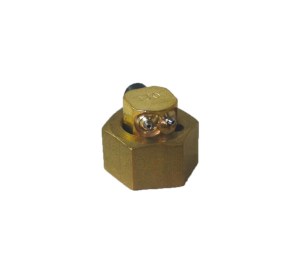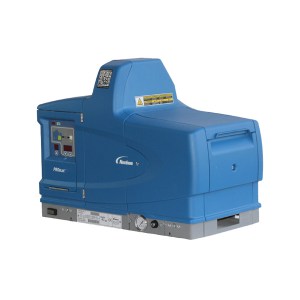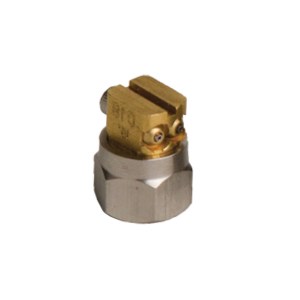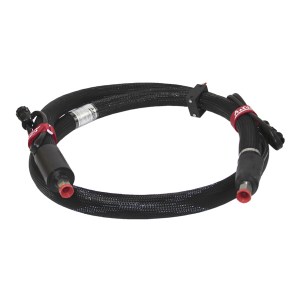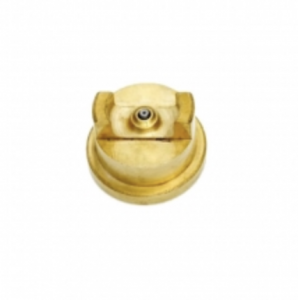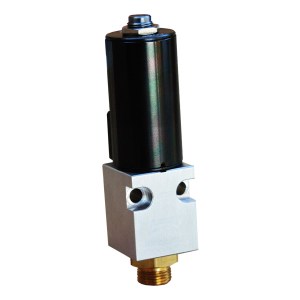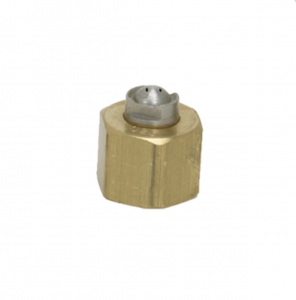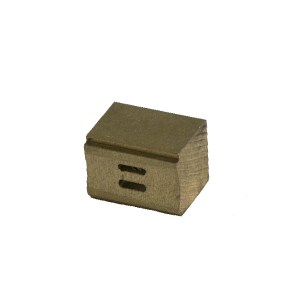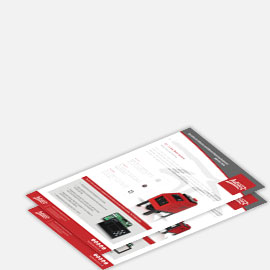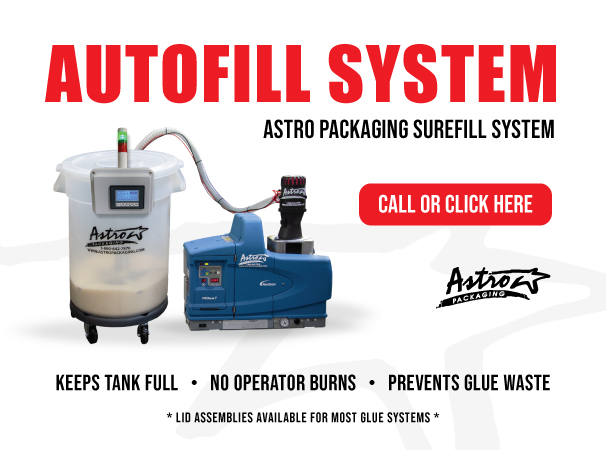Nozzle Plugging & Inconsistent Bead Placement? Hot melt nozzles are the last piece of equipment adhesive contacts when dispensing to production lines. Because of this, hot melt nozzles can have a big impact on the performance of your glue patterns. Astro Packaging manufacturing standards provide the highest tolerances to guarantee consistent be...
See also
Make the Most of Adhesive Equipment Preventative Maintenance Astro Packaging makes some of the finest adhesive equipment in the industry. Our high-tech, high-quality products will last you for years. But like all tools, they will start to break down over time from use. However, you can greatly lengthen the lifespan of your equipment and save yourse...
The rotary design of the SP-32-20 Thermoformer from Shawpak, a division of Riverside Medical Packaging Co., enables medical packagers and others to significantly reduce their thermoforming footprint and boost automation efficiencies.
The thermoformer can be used to form, fill and seal rigid and flexible blisters and to produce flat, four-side seal sachets and three-side seal premade pouches.
Rotary thermoformer saves space in medical cleanrooms
Featuring a compact vertical carousel instead of a linear design, the machine is both space- and energy-efficient. In cleanroom applications, the thermoformer’s footprint is less than 1.5 cubic meters, versus 4 to 12 linear meters for a conventional thermoformer.
Designed without clip chains, the machine eliminates trim, which translates into reduced materials waste. It features fast, simple changeover and can accommodate multiple web widths on a single machine.
The thermoformer features a flat, open surface that can be accessed from multiple sides for ease of loading, either manually, automatically or semi-automatically. In addition, the thermoformer costs 30% to 40% less than conventional machines, according to the manufacturer.
The XPA 934 meets digital requirements via a multitude of interfaces and real-time data available instantly to support print and apply processes in Industry 4.0 environments.
Fully loaded and enabled for leading-edge capabilities, the XPA 934 print-and-apply system is engineered for ease of installation and use by any level of customer.
Some key features:
Easy material handling and quick change of label and ribbon material;The machine’s compactness also allows it be mounted in any position to ensure maximum integration flexibility;100% tool-free maintenance and replacement of wear parts reduce downtime and increase productivity;Reduced manual handling result from quick, automatic adjustments and transfer of settings after changing the print head or material;The high robustness of the XPA 934 together with easy maintenance and quick material changes help ensure maximum uptime.The system also meets digital requirements with a a multitude of interfaces and real-time data that can be called up at any time support print & apply processes in Industry 4.0. These include multi-stage, configurable I/O points with M12 connectors for readily adaptable system interfaces. A cross-media provision of information ensures connection via LAN interface, access to operating instructions via convenient QR code and cable-free 1:1 connection via USB stick.
Orion’s S-Carriage delivers 260% pre-stretch and is adjustable for higher or lower pre-stretch as load requirements vary, saving an estimated $1,200 in film costs yearly.
Orion, a product brand of ProMach, introduces the brand’s new S-Carriage pre-stretch system for lowest stretch-film consumption required to contain the load. The S-Carriage becomes Orion’s new standard carriage and will roll out across all models by the end of 2020.
Orion estimates that replacing film carriages offering 234% pre-stretch with the S series’ assured 260% pre-stretch will increase the number of loads per roll from 135 to 154. In this scenario the film cost reduction over three years will be an estimated $3,600. Consistent pre-stretch of 260% and above reduces film acquisition costs for shippers and improves end-user sustainability through less waste. The S design also allows Orion’s customers to take advantage of evolving film technologies, which are now capable of reaching up to 600% pre-stretch.
Orion's S-Carriage delivers 180 degrees of film to roller contact, which reduces slippage and neckdown for improved film coverage and yield. The S pattern of film travel over carriage rollers is ideal for all types of cling films, even one-sided films, as the sticky side remains against the load for improved holding power. Automated Orion Insta-Thread and Insta-Cut features reduce film handling for labor savings, improve throughput and lower risk of worker injury.
Dear Valued Astro Packaging Customer, We write to notify you of recent developments affecting availability of essential raw materials for some of our products. From the beginning of the pandemic, Astro Packaging has worked diligently to ensure the supply of our adhesive products. We have successfully kept our adhesive pipeline open and n...
While not quite controversial, the results of our first poll on the viability of using voice-assistants to help monitor or control packaging machines or a packaging line were surprising.
Our 2017 survey results showed that 70% of potential users at brand owner companies were open to it. But only 50% of packaging machinery manufacturers saw promise in voice assistants for their machines or for packaging lines.
I first thought of the idea of using this technology in packaging production applications three years ago and talked with several packaging machinery manufacturers while I was at interpack 2017 to get their take, which was mixed.
As we’re coming up on another triennial interpack show, I wanted to re-poll the packaging community to see what, if any, shifts in acceptance have happened over the last several years. Has my idea taken hold??
Please take this short poll to let us know what you now think of this technology.
When moving products or packages in an industrial setting, properly matching a robot’s end-of-arm tooling to the materials being moved improves application effectiveness. That may seem like common sense, but hoisting or stacking different materials requires careful consideration of many essential variables to avoid accidents, injuries and downtime.
Primary considerations include:
• Size
• Weight
• Work piece shape
• Access
• Environment
• Work piece material/structure
• Motion
• Speed
One of the most common end-of-arm tooling options is the gripper. What is a gripper? Simply stated, a gripper is an interface between a robot or machine and the physical world. A gripper acts on the work piece (product or package), allowing the robot to hold and manipulate it as it performs a series of tasks.
It would require an in-house expert to review every option, setting and scenario of your operations, and how those elements can dictate your choice, but this baseline can give you the tools you need to begin evaluating your pick-and-place needs.
Now, let’s discuss whether mechanical grippers or vacuum grippers are best suited to solve your pick-and-place packaging challenges.
Food companies looking to automate their retail-ready packaging operation now have the option for a total solution that delivers speeds as high as 40 trays per minute, with the appropriate infeed.
At WestPack 2020 (Feb. 11-13; Anaheim, CA), two Pro Mach companies will demonstrate a new integrated system that combines an automatic tray former with an intermittent-motion sealer that feeds into an energy-efficient shrink tunnel.
Wexxar-Bel’s IPAK TF200 tray former mates with Texwrap’s 2219 L-sealer, which then passes filled and wrapped trays into a Texwrap 1322 Single-Chamber Forced Air Convection Tunnel at a pretty healthy clip. Conveyor speeds reach up to 100 feet per minute.
The combined machines are not limited to retail-ready packs for food companies, as they are also suitable for other markets and other secondary packaging operations.
Sporting a compact footprint, the four-corner tray former’s mandrel and compression configurations allow it to create a variety of trays, including those with more complex designs, such as telescoping lids, triangulated corners or retail-ready display designs (see photo at top of page).
Cloud, fog, edge: What’s in it for you?
The internet connected people. It allowed them to share all kinds of data in all kinds of ways. The Internet of Things (IoT) allows internet-connected devices to communicate directly. The IoT uses Artificial Intelligence (AI) to make decisions and initiate actions as needed, bypassing people altogether. The Industrial Internet of Things (IIoT) takes it to another level. On a packaging line, the IIoT allows machines to communicate and coordinate with each other faster and better than humanly possible.
The cloud is what makes this happen. The cloud is massive arrays of servers, apps, programs, storage and more in which this communication and decision-making takes place. Because they are massive, they must be centrally located which usually means that they are also remote. Centrality has its advantages but also has a huge disadvantage: speed. Electronic communication may be fast, but it’s not instantaneous. It takes time for data to travel to the cloud and the result to travel back to where it is needed. This travel time, called latency, can be milliseconds and is not a problem in many instances. In other cases, it is.
At 600 bottles per minute, the inspection system has 100 milliseconds to take a picture of a label, analyze it, and make a decision to accept or reject. If it has to send this off to the cloud for processing, even a few milliseconds of latency in transmission will hobble the camera’s effectiveness.
Edge computing moves the processing from the cloud to the edge of the network, putting the processing at the camera. The image is captured, analyzed and the accept/reject decision made locally. The data travels inches instead of thousands of miles. Periodically, the system reports to the cloud how many rejects occurred and why.
When a consumer purchases a 500-milliliter bottle of a soft drink, how do they know if they get the amount of product that they paid for? Fortunately, in most—if not all—developed nations, there are legislations that enforce acceptable levels of variation between declared net content and the actual weight or volume within a package. For instance, in the United States, there is the U.S. Department of Commerce’s Maximum Allowable Variation (MAV). The United Kingdom has the Weights and Measures (Packaged Goods) Regulations, which sets tolerable negative error (TNE).
While each country has its own rules, regulations, and methods of measurement and reporting, such legislations are all designed to protect consumers from buying underfilled packages. Food and beverage manufacturers, packagers and bottlers must thus take care to prevent underfilling and avoid possible fines or legal action—not to mention reputational risks. After all, with how fast news travels today, unhappy consumers with underfilled packages can quickly create a viral firestorm, making it hard to regain their trust and business. While such a firestorm may be unlikely for low-value products, such as bottled water, for more premium products, it may be much more likely.
To avoid underfilling, many organizations resort to some degree of overfilling within permissible levels of variation. However, overfilling simply provides a band-aid to the problem and can prove costly. Imagine overfilling by a small fraction on every product on a single bottling line. Those small fractions can quickly accumulate over time. Then, imagine that happening on an exponential scale across multiple lines in a single plant or several plants. It all adds up to significant financial costs—not only in product giveaway, but also wasted resources consumed to produce that additional content (across work hours, materials and machinery use). It’s the modern equivalent of the baker’s dozen.
For those who opt to absorb these costs, overfilling may seem like the only option. But a more data-driven approach is possible now, leveraging the latest in automation, digital sensors, process control and quality monitoring to effectively control net content. The result is a more refined packaging process—and much less underfilling or overfilling.
For food packagers that require flexible packaging, the Triangle/JDD Rotary Pouch Machine provides an automated method for filling and sealing premade pouches. The filler, from vertical form-fill-seal machinery manufacturer Triangle Package Machinery Co. and JDD Packaging Ltd., features an open machine design for proper sanitation and maintenance.
The system is compatible with Doyen-style bags, three-side seal pouches and stand-up pouches. Packagers can also switch between various film structures, including foil.
Application examples include granola, snacks, candy, nuts, powders and fresh, frozen or dried produce. Depending on the product, the filler uses either a Triangle InLine Combination Weigher or other scale or auger to fill pouches. Standard features include an integrated date coder and a pouch shaker to settle product.
The filler, which features tool-less changeover, can store up to 48 recipes and run multiple pouch sizes. A “no fill/no seal” feature reduces product and pouch waste by not dispensing product into pouches that haven’t opened; those pouches also bypass the machine’s sealing station.
The easy-to-operate filler comes in two models—Model JRPM-8812 and JRPM-81215—and delivers filling speeds of up to 50 pouches per minute.
Robots, easy-clean machine designs and self-contained automation devices were on packaging engineers wish lists this year—as evidenced by their interest in news about packaging equipment delivering production benefits, thanks to these features.
Based on page views, here are the top three packaging-machinery-related articles we posted over the last year, starting from the third article and moving up to No.1:
OnRobot's Gecko Gripper.
Estimating Hot Melt Coverage There are many factors that are important when buying hot melt besides what's in the formulas. Astro Packaging understands how hard it can be to determine the cost and coverage of hot melt. We want to guide you and make your life just a little easier by showing you some simple equations for finding your hot melt coverag...
The AstroPack is Back! From PackExpo 2019! Reliable Packaging Systems' adhesive & equipment team had recently made the not-so-perilous trek out to the deserts of Nevada for 2019's inimitable Pack Expo. And what a wonderful experience it was, not only because this year's series of events had been so much closer to us than Chicago's biennial take...
There has been a long debate between packaging application categories of tape and hot melt adhesives. The debate still continues and both products offer benefits over the other, but depending on application, hot melt adhesives are usually the best option for most customers. The first difference is cost; hot melt systems are more expensive than tape...
Increase the Lifetime of your Hot Melt Equipment with Preventative Maintenance. Interested in preventative maintenance or need equipment service? Look no more!Our factory trained technicians have OVER 80 YEARS of combined diagnostic & repair experience. Protect your investment, maximize productivity, and minimize downtime...Our service plans ma...
So what are the benefits of using low temperature hot melt? Improved Stability: The reduction in application temperature provides a substantial decrease in the thermal degradation of the adhesive. This will provide greater consistency from the adhesive, both in application characteristics and adhesive performance.Reduced Downtime: Hot Melts t...
Astro Packaging represents all major manufacturers of hot melt adhesive and is one of the largest stocking distributors in the U.S. With this purchasing power, we are able to keep adhesive costs down and provide affordably priced adhesive glue to our customers. We carry a broad portfolio of hot melt adhesives for use in general industrial app...
Hot melt adhesive customers regularly ask us what causes their glue guns or nozzles to leak or string. Some refer to the stringing as "angel hair" because of the thin hair-like webbing of adhesive that accumulates on their packaging machinery. This issue can be a simple housekeeping issue easily maintained or it can be severe enough to cause produc...


